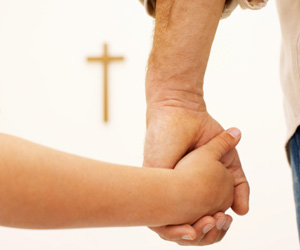 July 8, 2013 – In a case involving the death of an 11-year-old girl whose parents treated her illness with religious prayer, the state supreme court has clarified the state’s “prayer treatment exception” while upholding convictions for reckless homicide.
July 8, 2013 – In a case involving the death of an 11-year-old girl whose parents treated her illness with religious prayer, the state supreme court has clarified the state’s “prayer treatment exception” while upholding convictions for reckless homicide.
Under the prayer treatment exception, a person is not guilty of child abuse crimes “solely because he or she provides a child with treatment by spiritual means through prayer alone. …” The parents of a child who died in 2008 of a diabetic condition invoked the exception to defend against charges of second-degree reckless homicide.
That is, Dale and Leilani Neumann argued that Wisconsin’s second-degree reckless homicide statute criminalizes conduct that is legal under child abuse statutes. Thus, they didn’t have fair notice that a prayer treatment choice could be prosecuted.
But in a 71-page opinion in State v. Neumann, 2013 WI 58 (July 3, 2013), a Wisconsin Supreme Court Majority (7-1) ruled that Wisconsin’s statutes provides sufficient notice in cases where a parent has opted prayer over medicine and the child dies.
“[W]e conclude that the second-degree reckless homicide statute and the criminal child abuse statute provide sufficient notice that the parents’ conduct could have criminal consequences if their daughter died,” wrote Chief Justice Shirley Abrahamson.
The majority also ruled that parents have a legal duty to provide medical care to their children if necessary, which does not conflict with constitutional parenting rights.
Prayer Not Enough
Madeline Kara Neumann (Kara) died in 2008 from diabetic ketoacidosis, which occurs when the body lacks insulin to break down sugar in the blood. Her symptoms, which gradually worsened over several weeks, indicated this specific condition.
According to one expert witness, Kara was almost 100 percent certain to recover if timely treated with medicine, even “well into the day of her death.”
But the Neumanns, who identify as Pentecostals, don’t believe in medicine to treat illnesses. They believe religious prayer can cure health problems.
Thus, when their daughter experienced dehydration, exhaustion, and other symptoms, no physician was consulted. Instead, they relied on prayer to heal her the night before, when she became unresponsive, and up until her death the next day. The Neumanns thought she might have the flu; they did not believe she might die, they later argued.
On the day Kara died, a California relative with knowledge of the situation contacted paramedics but they arrived too late to revive her.
Dale and Leilani Neumann were subsequently convicted on charges of second-degree reckless homicide. Each was sentenced to serve 30 days in jail every year for six years, with 10 years of probation. Both appealed, invoking the prayer treatment exception.
Due Process Argument Fails
Whoever “recklessly causes great bodily harm to a child” is guilty of felony child abuse under Wis. Stat. section 948.03. Whoever “recklessly causes the death of another human being” is guilty of second-degree reckless homicide under section 940.06.
Wisconsin’s prayer treatment exception says a parent can’t be prosecuted for child abuse if the injury is caused “solely” from a decision to treat a sick child with prayer.
However, after Kara Neumann died, the state argued that her parents were guilty of second-degree reckless homicide because the exception does not extend to cases in which a child is treated with prayer over medicine and the child dies.
The child abuse and reckless homicide statutes, taken together, did not clearly define the boundaries of the prayer treatment exception, the Neumanns argued. They said their due process rights were violated because the statutes did not provide fair notice.
But the supreme court majority disagreed.
Constitutional due process requires criminal statutes to be clear about what conduct is prohibited, the majority explained, and the statutes here were clear.
“No one reading the treatment-through-prayer provision should expect protection from criminal liability under any other statute,” wrote the chief justice, noting the prayer treatment exception is expressly limited to child abuse offenses.
The majority also explained that the prayer treatment exception is not a “blanket protection” against child abuse prosecutions. It just protects the state from charging parents based “solely” on the choice to use prayer instead of traditional medicine.
Parental Duty to Provide Medical Care
The Neumanns argued that jury instructions imposed a parental duty to provide medical care, and no such duty exists when parents hold sincere religious beliefs.
However, the majority ruled that “a parent has a legal duty to provide medical care for a child if necessary,” and the jury instructions imposing that duty did not violate “a parent’s fundamental constitutional right to direct the care of his or her child.”
A sincerely held religious belief in treating illness with prayer is not a defense to second-degree reckless homicide, the majority clarified. Thus, defense counsel was not ineffective for failing to invoke their sincerely held religious beliefs as a defense.
Justice David Prosser wrote lone dissent, explaining that the “facts are not as black and white as they initially appear … the law governing the facts is imprecise and quite confusing,” and “the trials of the two defendants were problematic in several respects.”
He encouraged the bench, the bar, and legislature to revisit the decision, noting that “the issues involved in these cases are too important for me to remain silent.”
Related Article
Faith Healing: Supreme Court May Decide the Scope of Prayer Treatment Exception – WisBar InsideTrack, May 16, 2012 (login required).
